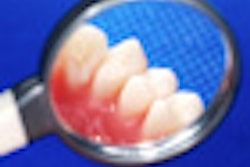Using a sensor made of densely packed carbon nanotubes coated with gold nanoparticles, a researcher team at the University of Connecticut has developed a low-cost microfluidic device for detecting oral cancer.
Tests on samples obtained from 78 oral cancer patients and 49 control subjects showed that the device has a clinical sensitivity of 89% and specificity of 98% for detecting oral cancer (Analytical Chemistry, June 14, 2012).
While other groups also have developed analytical methods that produce similar promise for detecting blood-borne biomarkers of oral cancer, these methods are based on time-consuming and expensive technologies. The microfluidic device developed by the University of Connecticut researchers simultaneously detects extraordinarily low levels of four proteins that together provide a diagnostic signature for oral cancer, they noted in a press release.
Magnetic beads, each coated with 120,000 antibody molecules, are used to capture even trace levels of specific biomarker proteins and remove them from a blood sample. The magnetic particles are then injected into the microfluidic device, which flows the beads over the sensor elements. Each sensor's electrical output corresponds to blood levels of a specific protein.
According to the investigators, the entire assay takes 50 minutes to perform. Each disposable carbon nanotube sensor chip costs about $9. The readout device uses available electronic components and pumps that together cost less than $26,000.



















